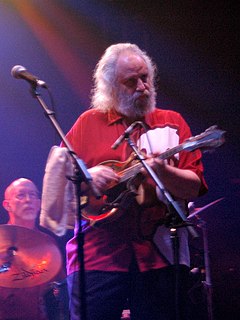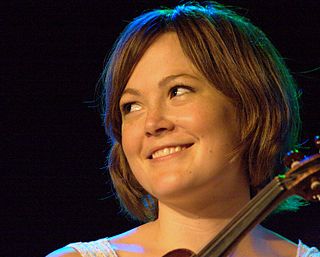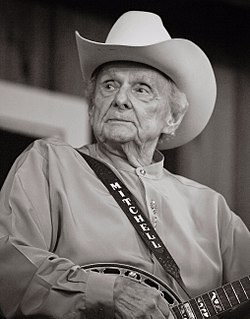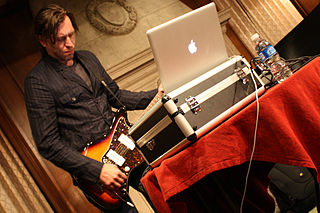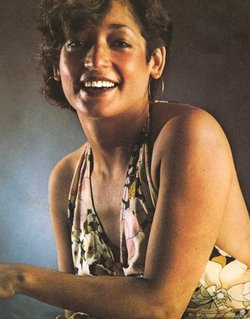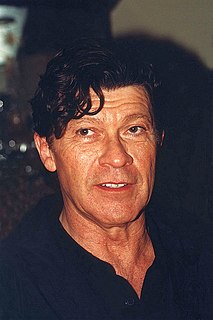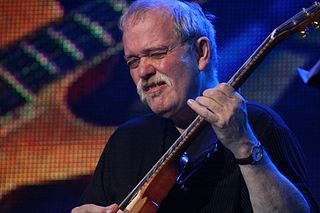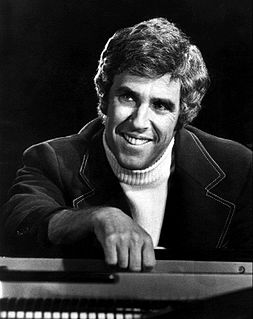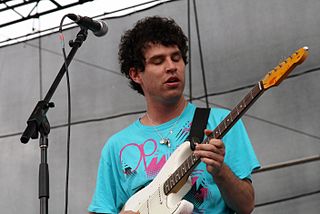A Quote by David Grisman
It was around that time, early 60s. There were like three kindred spirits in New Jersey. I had two friends who played folk music, old-time music and bluegrass and we started a little band called the Garret Mountain Boys.
Related Quotes
There was a band in San Diego, Bluegrass Etc, that played a weekly gig. My parents would take my brother and me every Saturday night for 7 or 8 years. Sean and I started taking lessons with them and they gave us a great foundation in bluegrass instrumentation. They were the lens through which I saw music for a very long time.
Bill Monroe spoke of bringing 'ancient tones' into his music with echoes of British and Irish fiddle and bagpipe music, while also delving deeply into American blues, gospel, folk hymnody, and hill country dance music. To that gumbo, he added the invigorating rhythms and harmonies of hot jazz. It was a new kind of American music, named in honor of his band The Blue Grass Boys to be known, simply, as bluegrass.
I started playing guitar at the age of 8 or 9 years. Very early, and I was like already into pop music and was just trying to copy what I heard on the radio. And at a very early age I started experimenting with old tape recorders from my parents. I was 11 or 12 at that time and then when I was like 14 or 15 I had a punk band. I made all the classic rock musician's evolutions and then in the early nineties I bought my first sampler and that is how I got into electronic music, because I was able to produce it on my own. That was quite a relief.
I grew up in a home filled with music and had an early appreciation of jazz since my dad was a jazz musician. Beginning at around age three I started singing with his band and jazz music has continued to be one of my three passions along with acting and writing. I like to say jazz music is my musical equivalent of comfort food. It's always where I go back to when I want to feel grounded.
Early American music and early folk music, before the record became popular and before there were pop stars and before there were venues made to present music where people bought tickets, people played music in the community, and it was much more part of a fabric of everyday life. I call that music 'root music.'
Cornelius Cardew very famous in Britain, because he was the darling of the avant-garde, and he played in a band called AMM, which was an improvising band in the '60s. Paul McCartney used to come watch them. Later on in life, he became disenchanted with avant-garde music, because he felt it couldn't reach the public. It didn't have a wide enough appeal. So he'd take these tunes of old English folk songs and write Stalinist lyrics over the top of them. I do think that when he changed to folk songs, he actually lost the tiny audience he already had, which is quite interesting.
In the United States, many people said you can't have folk music in the United States because you don't have any peasant class. But the funny thing was, there were literally thousands, tens of thousands, hundreds of thousands of people who loved old time fiddling, ballads, banjo tunes, blues played on the guitar, spirituals and gospel hymns. These songs and music didn't fit into any neat category of art music nor popular music nor jazz. So gradually they said well let's call it folk music.
It's weird, in New York, it's like the big theme of everything is folk music and interacting with people. Maryland is where the landscape of our music comes from, it was more like, let's walk around. People are saying that we are part of some sort of folk scene. We don't feel connected with it. We do live in the city, and communicate with people. It's all folk music.
